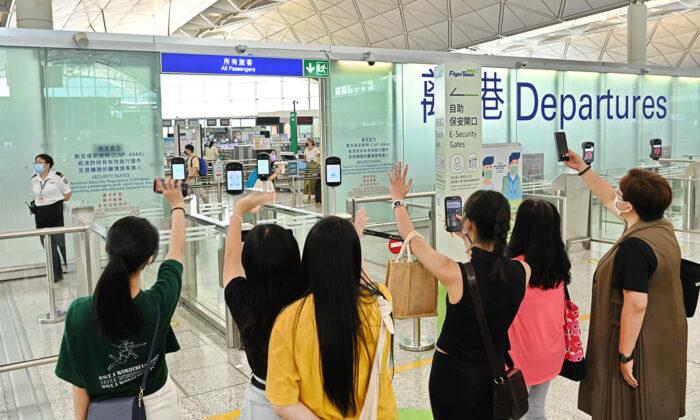Public Libraries Remove ‘Sensitive Books’ from Shelves
The Director of Audit’s Report No. 80 comprises eight chapters, one of which is titled “Management of Public Libraries.” This chapter highlights that public libraries have revised their procedures and guidelines for acquiring library materials and accepting book and periodical donations, with a new focus on safeguarding national security. As part of this initiative, libraries have conducted a preliminary review of their collections to identify materials that may pose a national security risk and have taken steps to remove them. The review was prompted by complaints or inquiries that raised concerns about potentially harmful content. In response to these concerns, libraries are committed to conducting ongoing collections reviews to ensure that materials detrimental to national security are identified and removed promptly.However, the Audit Report pointed out that the Leisure and Cultural Services Department (LCSD) has been reviewing library materials and taking necessary actions since 2021. As of February, this work is still in progress. The report suggests that the LCSD must increase its efforts to review library materials to safeguard national security.
The (LCSD) explained that the review of books had seen a recent surge, making it difficult to set a definitive completion date for the process. The complexity of the books in the library’s collection varies significantly, rendering it impossible to establish a standard indicator for measuring the time required to complete the review. LCSD has completed an initial review of the collection, including works by authors and publishers suspected of producing “independent Hong Kong” books.
In another section of the report, it is noted that there exists a disparity between the number of library materials obtained and the amount designated in the collection development plan. The LCSD clarified that the number outlined in the plan was solely for planning purposes and not a precise target. Additionally, more time was necessary to carefully select library materials to ensure national security, and fewer appropriate titles were available for procurement. Quotes from experts in the field lend credibility to this explanation.
Only Patriots Should Hold EOC Positions
Under the “Management of the Equal Opportunity Commission” section, the EOC has proactively announced several measures in response to the National Security Law coming into effect. These measures include uploading reference materials of the National Security Law on the intranet for staff reference and self-study to safeguard national security. The EOC will also study the inclusion of a vetting mechanism in the recruitment process to ensure that only those who meet the “patriot” requirement can fill job vacancies. Moreover, the EOC will conduct background checks on service providers or participating organizations that apply for or seek to co-sponsor self-financed or funded projects, such as surveys, research, and equal opportunity community involvement funding programs. To explicitly describe the responsibility to safeguard national security, the EOC has revised the Internal Procurement of Goods and Services Manual to include provisions that allow the EOC to disqualify bidders and terminate contracts. These steps demonstrate the EOC’s commitment to protecting national security while fulfilling its mission to promote equal opportunities for all.In the “Construction Industry Innovation and Technology Fund” chapter, the Audit report discovered a lack of guidelines and requirements for maintaining national security in the “Construction Industry Innovation and Technology Fund” chapter, as of January. In response, the Development Bureau conducted a review in August 2022 and proposed amendments to enhance national security protection. However, legal advice is still being sought on the proposed amendments to ensure they comply with legal requirements.
The Hong Kong Design Centre (HKDC) has also encountered a comparable scenario. In response, the Culture, Sports, and Tourism Bureau has reported that it signed a revised agreement with the HKDC in March. This agreement included the integration of relevant guidelines and requirements to safeguard national security.
Flagpole installation work is still unfinished, with 30 percent of the job remaining.
In the chapter “Maintenance and Improvement of Aided School Premises,” the Audit Commission highlighted the new requirements for primary and secondary schools outlined by the National Flag and Emblem (Amendment) Ordinance that took effect in October 2021. According to the commission’s report, schools will be mandated to raise the five-star red flag each school day and conduct weekly flag-raising ceremonies from Jan. 1, 2022.
The Education Bureau (EDB) approved 123 applications for flagpole installations during the 2022/23 cycle of major repair works, as per the audit report. However, the report also revealed that 41 of these applications (33 percent) were withdrawn by schools as of November 2022, while 22 flagpole installations (27 percent) still needed to be completed. In response to the audit report, EDB stated that it would take measures to ensure that repairing non-operational flagpoles is treated as an emergency repair project to expedite the construction period.
Scholar Chong Kim-wah highlighted in an interview with this newspaper on April 26 that the Audit Commission’s primary responsibility should be to conduct administrative audits on public departments, funding agencies, and organizations. However, he noted that the Commission is now more focused on political censorship. Chung speculated that the current social atmosphere may have influenced the Commission’s shift towards political correctness, resulting in a more left-leaning approach. The Commission may have received instructions to adopt this stance.
According to Chong, the future trend will likely reflect the current social atmosphere, where loyalty is a top priority, everyone is tested, and government power reigns supreme. Chung estimates that the recent requirement for civil servants and subvented organization staff to take an oath is just the beginning. He predicts that in the future, every staff member may be required to submit an annual review as part of their performance evaluation. Furthermore, all government and subvented organizations, public organizations, schools, and other institutions may have to undergo national security audits to ensure compliance with regulations.




